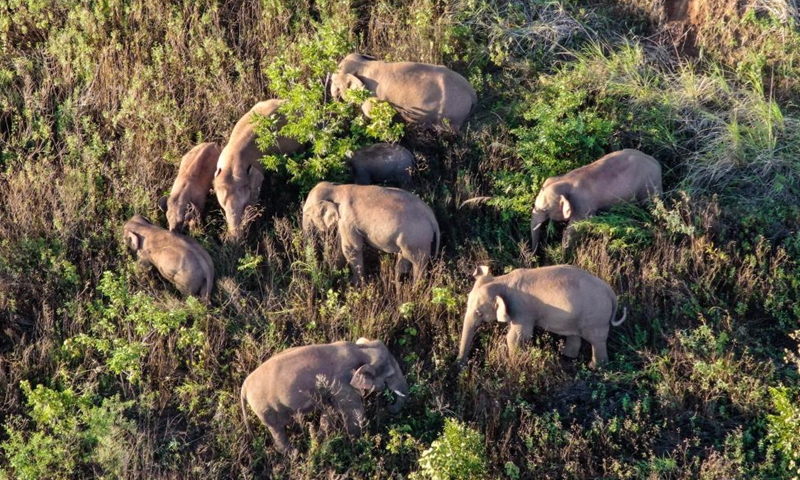
Aerial video clip taken on June 20, 2021 shows the Asian elephants in Dalongtan Township of Eshan County, Yuxi City of southwest China's Yunnan Province.Photo:Xinhua
During the World Elephant Day on Thursday, Chinese and overseas experts gathered in one online forum to discuss ways to effectively protect elephants based on the migration of a herd 15 wild elephants in Southwest China’s Yunnan Province. This shows how Chinese people care about the protection these giant friends.
The forum was organized by the China Biodiversity Conservation and Green Development Foundation (CBCGDF) with the theme, “From conflict over resources to valuable allies in the fight against climate change: a new understanding of the importance of elephants.”
Experts on wildlife from around the world were invited to the online forum, including Zhang Chenglin, Deputy Director of the Beijing Zoo, Amy Frankel, Executive Secretary of the UN’s Conservation of Migratory Species of Wild Animals, and the former director of the UNEP, Shende Rajendra.
Experts talked about the difficulties of humans coexisting with elephants and how to offer more friendly habitats for the wild animals. Zhang also mentioned how elephants kept in the zoo can be happier.
15 wild Asian elephants, including one male that turned back in July, finally returned to their original habitat after touring for 17 months in Yunnan Province.
The case was taken by the experts as a successful example on how to protect and guide the migration of wild elephants.
The elephants wandered for more than 1,300 kilometers over 17 months and to ensure safety of both humans and elephants, the provincial authorities evacuated over 150,000 local residents. Almost 180,000 kilograms of food were consumed by the elephants.
In the past few days, more than 25,000 police officers and staff in Yunnan have been dispatched to follow the elephants with the support of 973 drones and more than 15,000 emergency vehicles, according to the media outlet, The Paper.
The large scale of manpower and resource is required to ensure elephants can return to their home safe and healthy.
Experts on the forum suggested that according to experience gathered with this migration, Chinese authority can build more ecological corridors for elephants allowing them to migrate following their natural instincts and also reduce losses for local residents.
Zhou Jinfeng, Secretary-General of the CBCGDF, mentioned an initiative called “Biodiversity Conservation in Our Neighborhood” which focuses on helping wild animals survive and develop by reducing the disturbance to nature and wildlife in our daily lives.
Zhang Chenglin, Deputy Director of the Beijing Zoo, introduced measures taken by Chinese zoos to take good care of elephants, adding that there are around 150 elephants living in zoos around China, 70 male and 80 female.
Zhang also mentioned that a guidebook on how to breed Asian elephants has been published in China, including breeding management procedures for captive animals.
Zhang added that breeding facilities for elephants at each zoo have been developed.
“Humans and animals share nature. To protect elephants is to protect our home planet. Hope we can cooperate with other countries to better protect wild animals,” one netizen commented on Sina Weibo on the World Elephant Day.

